英语语法-形容词、副词讲解
高中英语语法系列――形容词和副词

高中英语语法系列――形容词和副词[知识梳理]一、形容词的概念与用法形容词(adjective)用以修饰名词,表示人或事物的特征。
它可在句中充当定语,修饰名词、代词;可以作表语或宾(主)语的补足语,表示主语或宾语的状态、特征;有时也可以作状语。
如:This is a beautiful school.这是一所美丽的学校。
(作定语,修饰名词school)I have something important to tell you.我有些重要的事要告诉你们。
(作定语,修饰不定代词something)Our school is beautiful.我们学校很美丽。
(作表语)We’ll make our school more beautiful.我们要使我们的学校更美丽。
(作宾补)Our school will be made more beautiful.我们的学校将会变得更美丽。
(作主补)He got home late that night, hungry and tired.那天晚上他很迟才回来,又累又饿。
(作状语)二、副词的概念与用法副词(adverb)用以修饰动词、形容词或其它副词。
它在句中主要作状语,个别副词也可作表语、定语、或宾(主)语补足语。
He studies hard.他学习很努力。
(作状语,修饰动词)I’m terribly sorry for being late. 非常抱歉,我迟到了。
(作状语,修饰形容词)This coat fits him very well.这件上衣他穿着很合适。
(作状语,修饰副词)The people here are kind to us.这里的人对我们很好。
(作定语,修饰The people)When will you be back? 你什么时候回来?(作表语)三、形容词与副词的转换有的形容词加上ly后可转换成副词,规则如下:注意:friendly, motherly, lovely等词虽然以ly结尾,但不是副词,而是形容词。
初一英语形容词和副词语法知识总结(讲解+考点+综合练习):形容词和副词
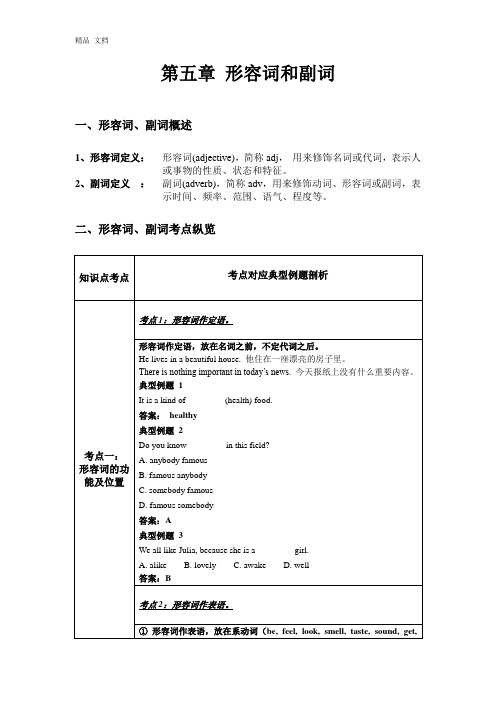
第五章形容词和副词一、形容词、副词概述1、形容词定义:形容词(adjective),简称adj,用来修饰名词或代词,表示人或事物的性质、状态和特征。
2、副词定义:副词(adverb),简称adv,用来修饰动词、形容词或副词,表示时间、频率、范围、语气、程度等。
二、形容词、副词考点纵览三、综合练习( )1. –If you don’t like the red coat, how about the green one?–OK, but do you have _______ size in green? This one is a bit small for me.A. a bigB. a biggerC. the bigD. the bigger( )2. –Mum, I think I’m _______ to get back to school.–Not really, my dear. You’d better stay at home for anoth er day or two.A. so wellB. so goodC. well enoughD. good enough ( )3. –What delicious cakes! –They will taste _______ with butter.A. goodB. betterC. badD. worse( )4. –Mr. Zhou , of all the students in our group, who lives _______ ?–I think Li Lei does.A. farB. fartherC. farthestD. the farther( )5. With a history of more than 1,400 years, ZhaoZhou Bridge is the _______ stone arch bridge in the world .A. oldB. olderC. oldestD. elder( )6. Bob never does him homework _______ Mary. He makes lots of mistakes.A. so careful asB. as carefully asC. carefully asD. as careful as ( )7. A: How can I speak English _______ you?B: You’d better speak more, I think.A. as good asB. more thanC. as well asD. as much as( )8. Your English is good. I’ll try my best to speak it as _______you do.A. clearly asB. clear asC. clearer thanD. more clearly ( )9. –Is your mother badly ill?–No, _______ , only a little cold.A. serious anythingB. serious nothingC. nothing seriousD. anything serious( )10. I’m not sure if I’m going to Tim’s party; I may go to the concert _______ .A. onlyB. insteadC. earlyD. late( )11. Although they are brothers, they are the _______ opposite of one another.A. veryB. justC. fewD. little( )12. The new Bright Restaurant is _______ than the old one. Moore and more people like to eat there.A. goodB. betterC. badD. worse( )13. Wang Ping does _______ in physics that I missed the first class.A. badlyB. Most badlyC. worseD. worst( )14. I got up so _______ this morning that I missed the first class.A. earlyB. lateC. quietlyD. neatly( )15. –Do you enjoy traveling by plane?–No. It’s _______ expensive.A. much moreB. more muchC. too muchD. much too( )16. I’m afraid the headmaster is _______ busy to meet the visitors.A. too muchB. much tooC. so muchD. much too( )17. How beautifully she sings! I’ve never heard _______ .A. the better voiceB. a good voiceC. the best voiceD. a better voice( )18. You do well in your lessons. I’m _______ you will pass the exam.A. sureB. afraidC. sadD. sorry( )19. –Who is _______ in your class?–Fred.A. tallB. tallerC. tallestD. the tallest( )20. –What do you think of the football match?–Wonderful! The Chinese football team has never played _______ .A. betterB. bestC. worseD. worst( )21. The population of China is _____ than _____ of any other country in the world.A. larger , the oneB. more , thatC. larger , thatD. more , the one ( )22. There is much wine here, but _______ people want to drink it.A. manyB. a littleC. fewD. a few( )23. People speak ______ of the film Not One Less. It is really necessary for every child to go to school.A. loudB. loudlyC. highD. highly( )24. She always finishes her homework on time. She ______ leaves it for tomorrow.A. alwaysB. neverC. usuallyD. sometimes( )25. The football match was _______, so the boys were _______ about it.A. excited , excitingB. exciting, excitedC. excited , excitedD. exciting , exciting( )26. Playing table tennis isn’t difficult. You can learn it _______.A. easyB. easilyC. quickD. hardly( )27. We Chinese always put our family name _______.A. lastB. nearlyC. firstD. in the middle ( )28. This kind of T-shirt look _______ and sells _______ in the market.A. nice, goodB. well , wellC. nice , wellD. good , nice( )29. The light in the room wasn’t _______ for me to read.A. brightly enoughB. enough brightlyC. enough brightD. bright enough( )30. –Look, this digital camera is really cheap! It’s only five hundred yuan.–The _______ , the better. I’m short _______ money, you know.A. cheaper , ofB. cheap, forC. expensive , ofD. more expensive , for( )31. Which subject do you like _______ , math, Chinese or English?A. betterB. bestC. wellD. very much( )32. _______ little water is not enough for _______ many people.A. Such , soB. So , soC. Such , suchD. So , such( )33. English is spoken by _______ people.A. a lotB. much manyC. a large number ofD. a great deal of ( )34. –Isn’t that Mary?–Yes, she always has a(an) _______ smile on her face.A. aloneB. kindlyC. ownD. friendly( )35. –Do you prefer music to drawing?–No. I like drawing _______.A. wellB. mostC. betterD. best( )36. Since China has been a member of the WTO, English is ______ useful than before.A. moreB. mostC. muchD. very( )37. Can you speak a little louder? I can _______ hear you.A. hardB. reallyC. hardlyD. clearly( )38. China has a _______ population and long history.A. manyB. largeC. muchD. big( )39. Do you have _______ to say?A. important anythingB. anything importantC. important somethingD. something important( )40. Which is _______ , English or Chinese?A. interestingB. interestingerC. more interestingD. most interesting( )41. –The TV programme is boring. Shall we play chess intead?–All right. That is _______ than watching a boring programme.A. very goodB. much goodC. very betterD. much better( )42. –Mum, could you buy me a dress like this?–Certainly, we can buy _______ one than this, but _______ this.A. a better, better thanB. a worse , as good asC. a cheaper , as good asD. a more important , not as good as ( )43. Let’s enjoy the song Yesterday Once More. It sounds _______.A. wellB. sadlyC. niceD. bad( )44. –Is the physics problem _______ ?–Yes. I can work it out _______.A. easy , easilyB. easy, easyC. easily , easyD. easily , easily ( )45. Hainan is a very large island. It’s the second _______ island in China.A. largeB. largerC. largerD. most large( )46. What a _______ cough! You seem _______ ill.A. terrible, terriblyB. terribly , terribleC. terrible , terribleD. terribly , terribly ( )47. I’m not sure whether Mary can sing _______ Mabel.A. as well asB. as good asC. so good asD. as better as( )48. Chinese is _______ more difficult than English.A. mostB. veryC. manyD. much( )49. The _______ old man told his son to be a good boy.A. diedB. deadC. dyingD. death( )50. Today my sister is feeling _______ to go to the factory.A. enough goodB. good enoughC. well enoughD. enough well参考答案精品文档1—5 B C B C C6—10 B C A C B11—15 A B D B D16—20 B D A D A21—25 C C D B B26—30 B C C D A31—35 B B C D C36—40 A C B B C文档说明(Word文档可以删除编辑)专注于精品文档:中考、高考、数学语文英语试卷、高中复习题目、小学试卷教案合同协议施工组织设计、期中、期末等测试,本文档目的是为了节省读者的工作时间,提高读者的工作效率,读者可以放心下载文档进行编辑使用.文档来源网络改编,审核有可能疏忽,如果有错误或侵权,请联系本店马上删除。
中考英语形容词和副词语法讲解--形容词和副词的比较等级

初中英语形容词和副词语法讲解--形容词和副词的比较等级一、形容词的比较等级(一)没有比较等级的形容词有些形容词说明形状、材质等,还有些形容词没有程度可分或其本身就表示某种程度,这些形容词都没有比较级和最高级。
常见的没有比较等级的形容词有:right 正确的wrong 错误的round 圆的wooden 木质的favourite 最喜欢的golden 金色的first 第一的last 最后的final 最后的east 东方的impossible 不可能的(二)形容词比较级、最高级的构成1. 规则变化:变化规则原级比较级最高级一般在词尾直接加-er/-esttall taller tallestlong longer longest以不发音的字母e结尾的单词,在词尾直接加-r/-st nice nicer nicest large larger largest以“辅音字母+y”结尾的词,把y变i,再加-er/-est heavy heavier heaviest happy happier happiest重读闭音节,且末尾只有一个辅音字母,双写这个辅音字母,再加-er/-est big bigger biggest hot hotter hottest多音节词和部分双音节词在原级前加more构成比较级,加most构成最高级importantmoreimportantmostimportant beautifulmorebeautifulmostbeautiful2.不规则变化:原级比较级最高级good/well better bestbad/ill worse worstmany/much more mostlittle less leastold older/elder oldest/eldestfar farther/further farthest/furthest(三)形容词比较等级的用法1.原级的用法(1)肯定句中用“as+原级形容词+as”表示双方在程度、特征等方面相同。
英语语法之形容词副词讲解

形容词和副词一、形容词1)、⑴作定语时放在名词的前面,且音节少的词放在音节多的词之前。
如:a big yellow wooden wheel(一个黄色的大木轮)⑴作表语时放在连系动词之后。
如:The price sounds reasonable.(这个价格听起来算是合理)⑴作宾语补足语时放在宾语之后。
如:We must try our best to keep our environment clean.(我们必须尽力保持我们的环境清洁)⑷后置的情况:⑴修饰复合不定代词时放在代词之后。
如:Something important 一些重要的事情⑴与表示“长、宽、高、重、老、远离”的词连用时形容词后置。
如:He’s 1.8 metres tall.(他身高1.8米。
)二、副词(1)作状语1.时间副词:一般放在句首或句尾,注意,early、late、before、later、yet等一般放在句尾,already、just一般放在动词的前面。
如:We will visit the Great Wall tomorrow.(我们明天要去参观长城) /2.地点副词:一般放在句尾,但here、there还可放在句首。
如:There you can see thousands of bikes running in all directions(方向).3.方式副词:一般放在行为动之后,suddenly可以放在句首、句尾或动词之前。
如:Old people can hardly walk as quickly as young people.(老年人几乎不可能走得和年轻人一样快) / Suddenly he saw a light in the dark cave(山洞).(突然,在黑黢黢的山洞里,他看见了一丝亮光)4.程度副词:修饰动词时,放在动词之前;修饰形容词或副词时,放在形容词或副词之前。
但注意,enough总是放在被修饰的形容词或动词的后面;only位置比较灵活,总是放在被修饰的词的前面。
英语语法——形容词与副词
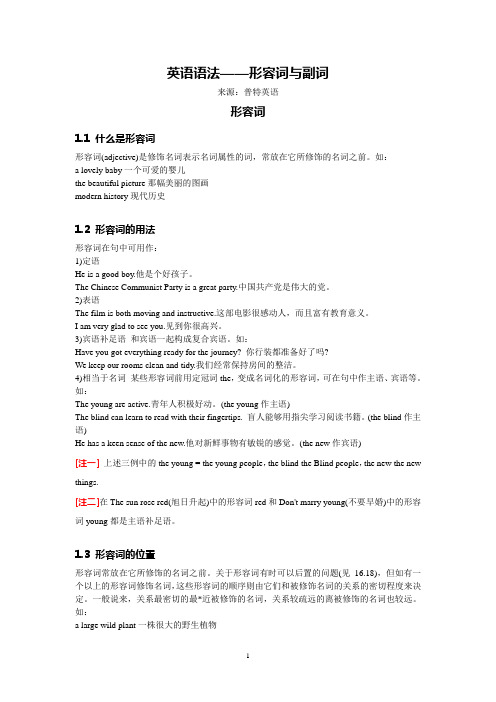
英语语法——形容词与副词来源:普特英语形容词1.1 什么是形容词形容词(adjective)是修饰名词表示名词属性的词,常放在它所修饰的名词之前。
如:a lovely baby一个可爱的婴儿the beautiful picture那幅美丽的图画modern history现代历史1.2 形容词的用法形容词在句中可用作:1)定语He is a good boy.他是个好孩子。
The Chinese Communist Party is a great party.中国共产党是伟大的党。
2)表语The film is both moving and instructive.这部电影很感动人,而且富有教育意义。
I am very glad to see you.见到你很高兴。
3)宾语补足语和宾语一起构成复合宾语。
如:Have you got everything ready for the journey? 你行装都准备好了吗?We keep our rooms clean and tidy.我们经常保持房间的整洁。
4)相当于名词某些形容词前用定冠词the,变成名词化的形容词,可在句中作主语、宾语等。
如:The young are active.青年人积极好动。
(the young作主语)The blind can learn to read with their fingertips. 盲人能够用指尖学习阅读书籍。
(the blind作主语)He has a keen sense of the new.他对新鲜事物有敏锐的感觉。
(the new作宾语)[注一]上述三例中的the young = the young people,the blind the Blind people,the new the new things.[注二]在The sun rose red(旭日升起)中的形容词red和Don't marry young(不要早婚)中的形容词young都是主语补足语。
高中英语语法讲解--形容词和副词

这类词还有: well,unwell,ill,faint,afraid,alike,alive,alone,asleep,awake 等。
3)形容词作定语修饰名词时,要放在名词的前边。但是如果形容词修饰以-thing为字尾的词语时,要放在这些词之后,例如:
以不发音的e结尾 nice(好的) nicer nicest
的单音词和少数 large(大的) larger largest
以- le结尾的双 able(有能力的) abler ablest
音节词只加-r,-st
以一个辅音字母 big(大的) bigger biggest
2) 叙述形容词只能作表语,所以又称为表语形容词。这类形容词没有级的变化,也不可用程度副词修饰。大多数以a开头的形容词都属于这一类。例如:afraid 害怕的。
(错) He is an ill man.
(对) The man is ill.
(错) She is an afraid girl.
答案A. 几个形容词修饰一个名词,他们的排列顺序是:年龄,形状,大小+颜色+来源+质地+用途+国家+名词。
3) ---- How was your recent visit to Qingdao?
---- It was great. We visited some friends,and spent the ___days at the seaside.
4. 形容词和副词
4.1 形容词及其用法
形容词修饰名词,说明事物或人的性质或特征。通常, 可将形容词分成性质形容词和叙述形容词两类,其位置不一定都放在名词前面。
完整版初中英语形容词及副词用法讲解
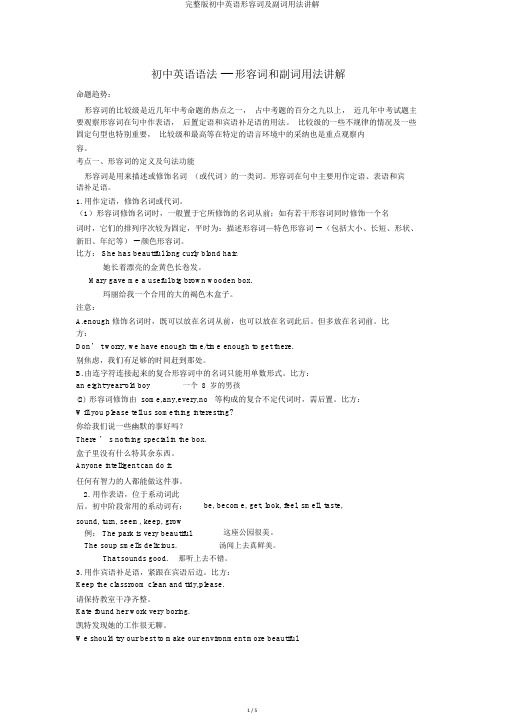
初中英语语法 --- 形容词和副词用法讲解命题趋势:形容词的比较级是近几年中考命题的热点之一,占中考题的百分之九以上,近几年中考试题主要观察形容词在句中作表语,后置定语和宾语补足语的用法。
比较级的一些不规律的情况及一些固定句型也特别重要,比较级和最高等在特定的语言环境中的采纳也是重点观察内容。
考点一、形容词的定义及句法功能形容词是用来描述或修饰名词(或代词)的一类词。
形容词在句中主要用作定语、表语和宾语补足语。
1.用作定语,修饰名词或代词。
(1)形容词修饰名词时,一般置于它所修饰的名词从前;如有若干形容词同时修饰一个名词时,它们的排列序次较为固定,平时为:描述形容词—特色形容词 -- (包括大小、长短、形状、新旧、年纪等) -- 颜色形容词。
比方: She has beautiful long curly blond hair.她长着漂亮的金黄色长卷发。
Mary gave me a useful big brown wooden box.玛丽给我一个合用的大的褐色木盒子。
注意:A.enough 修饰名词时,既可以放在名词从前,也可以放在名词此后。
但多放在名词前。
比方:Don’ t worry, we have enough time/time enough to get there.别焦虑,我们有足够的时间赶到那处。
B.由连字符连接起来的复合形容词中的名词只能用单数形式。
比方:an eight-year-old boy一个8岁的男孩(2)形容词修饰由 some,any,every,no 等构成的复合不定代词时,需后置。
比方:Will you please tell us something interesting?你给我们说一些幽默的事好吗?There ’ s nothing special in the box.盒子里没有什么特其余东西。
Anyone intelligent can do it.任何有智力的人都能做这件事。
形容词和副词英语语法讲解

• 1.She is my best firend ,so I know her very __
• A.good B .fine C.nice D.well
• 解析D本体考察的是形容词修饰名词。副词修饰动词的用 法本句意思是他是我的好朋友,因此我很了解他本句要修 饰是动词故用副词well
四、形容词和副词的比较等级
2. This building looks not so (as) high as that one.
3. This room is three times as large as that one.
比较级 1. 构成形式: - er more
注意不规则变化
more worse less
better farther further
原级
1. 肯定
2. 否定 3. 倍数源自as + adj. / adv. 原级 + as
not as (so) + adj. / adv. 原级 + as 倍数 + as + adj. / adv. 原级 + as
•
twice a larger than
倍数+ the size (height, length, width) + of 如:1. Mr. Sun speaks English as fluently as you.
• “…得多”:many, much, a lot, far, by far • “更,甚”:even, still
4. 比较级句型表达最高级含义 + any other + 单数名词
比较级 + the other + 复数名词 + any of the other + 复数名词
高中英语语法-形容词和副词讲解

(3) tall与high: Tall 指身高的高度,用于人和动物, 反义词为short He is very short/tall.
High 指物体的高度,另可形容价格,质量等, 反义词 为low
The kite is flying very high.
Tall和high都可用来指tree, building, tower等, 但mountain只能用high形容。
(4) too much与much too:
too much表示“太多的”,修饰事物数量; much too表示“太过,过分”,修饰形容词或副词: I am full because I have had too much rice. That coat is much too dear.
形容词的功能及位置:
(一)作定语
1.前置定语 (1)形容词作定语一般需放在它所修饰的名 词之前并尽量靠近被修饰的词。在这种位置上 的定语叫前置定语。语序一般为“冠词(或其 他限定词)+形容词+名词”。 He is an honest boy.
(2)若有多个形容修饰名词,它们的位置要由它们与
副词就是修饰或限制动词或形容词作用、表程度或范 围的词
举例:
1.Chinese, glass, a, beautiful, table a beautiful Chinese glass table 2.wonderful, my, garden, new, large my wonderful large new garden 3. a, round, table, small a small round table 4. a, old, dirty, brown shirt a dirty old brown shirt
高中英语2025届高考语法复习形容词与副词知识讲解
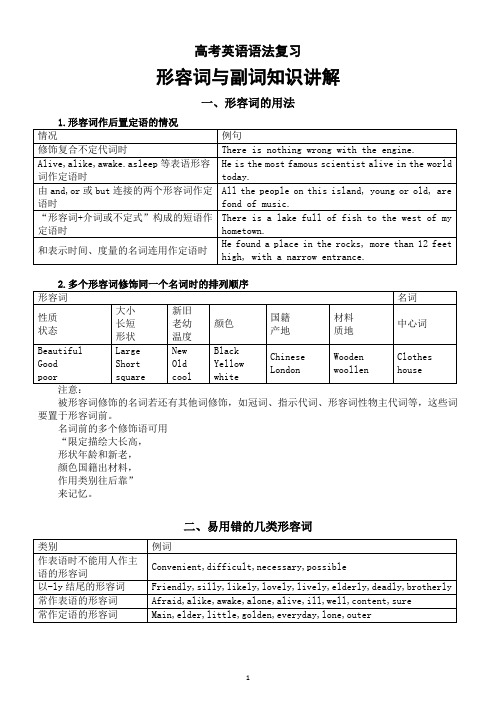
高考英语语法复习
形容词与副词知识讲解
一、形容词的用法
被形容词修饰的名词若还有其他词修饰,如冠词、指示代词、形容词性物主代词等,这些词要置于形容词前。
名词前的多个修饰语可用
“限定描绘大长高,
形状年龄和新老,
颜色国籍出材料,
作用类别往后靠”
来记忆。
二、易用错的几类形容词
三、形容词的比较等级
English is as interesting a subject as Chinese.
Which is the better of the two watches?
She is the taller of the two girls.
other或else把主语排除在比较对象之外;但如果不在同一范围比较则不需要用。
Susan is taller than any girl in her sister’s class.
四、副词的句法功能
五、副词的位置
六、副词比较等级的用法。
高中英语语法系统讲解之四形容词和副词

高中英语语法系统讲解之四形容词和副词形容词和副词形容词一. 形容词的语法功能形容词用来修饰名词或代词,表示人或事物的性质、状态或特征。
在句中作定语、表语、宾语补足语以及状语。
形容词前加定冠词the,相当于一个名词。
如He is a young Russian soldier. The film is interesting.He likes to paint the wall pink. Lucy came to the party, happy.The blind are taught how to do the work.温馨提示:1. 有些形容词通常作表语和补语,不能像普通形容词那样作前置定语,这样的形容词称为表语形容词。
如alive, alone, asleep, alike, afraid, awake, ashamed, able, sure, ill, worth等;其作定语时后置。
2. 有些形容词只能作定语,不能作表语,这样的形容词称为定语形容词,如golden, wooden, silken, live, elder, former, latter, front, back, outer等二. 形容词的分类1. 性质形容词○1外观:long, strong, big, round, fat, beautiful, old等○2性质:good, clean, new, fresh, soft, excellent等○3颜色:red, black, green, blue, white, brown等○4情绪:happy, sad, sorry, nervous, anxious等○5性格:kind, cruel, honest, foolish, lazy, rude等○6状况:careful, blind, deaf, cheap, hungry等○7评论:great, true, necessary, difficult, wrong等2. 关系形容词○1地域:Chinese, American, Asian, Pacific 等○2质料:wooden, golden, plastic, metallic 等○3科技:electric, chemical, atomic,medical等○4意识:communist, social, political, religious等○5行业:industrial, agricultural, economic, military等三. 形容词在句中的位置1. 单个形容词作定语时,一般放在被修饰的名词之前;两个或两个以上的形容词修饰一个名词时,同种类形容词的排列顺序一般应考虑以下两种情况:○1和被修饰的名词关系比较密切的形容词位置更靠近名词。
英语语法—形容词副词比较级最高级讲解

形容词和副词的比较级、最高级讲解一、分类:形容词和副词有原级、比较级、最高级三级。
原级变为比较级和最高级有规则变化和不规则变化两种。
1、规则变化1).一般在词尾直接加er或est,例如,tall-taller-tallest,long-longer-longest2).以不发音的字母e结尾的单词在词尾直接加r或st,例如,nice-nicer-nicest3).以辅音字母+y结尾的词,把y变为i,再加er或est,例如,heavy-heavier-heaviest4).重读闭音节,末尾只有一个辅音字母,双写这个辅音字母,再加er或est,例如,big-bigger-biggest5).部分双音节词和多音节词分别在原级前加more构成比较级和most构成最高级,例如,slowly-more slowly-most slowly;beautiful-more beautiful-most beautiful2、不规则变化二、形容词,副词等级的用法(1)讲述某人/物自身的情况时,用原级。
基本句型是:主语(sb./sth) + 谓语动词+ (very/too/so/quite/rather…) + 形容词/副词原级+….如:He is very old now.(他现在很老了) / They ran quite fast.(它们跑得相当快) / The weather looks rather bad.(天气看上去相当糟) / I am so happy!(我是如此的快乐)☆表示两者之间没有差别时,使用句型:主语(第一个人物) + 谓语动词 + as + 形容词/副词原级 + as + 第二个人物+….如:He is as excited as his younger sister.(他和他妹妹一样兴奋)/ Lily rode her bike as slowly as an old lady.(莉莉骑车像老太太一样慢)/ They picked as many apples as the farmers (did).(他们摘的苹果和农民一样多) ☆表示第一个人比不上第二个人时,使用句型:主语(第一个人物) + 谓语动词(否定式) + as / so + 形容词/副词原级 + as + 第二个人物+….如:He is not so / as excited as his younger sister.他没他妹妹那么兴奋Lily did not ride her bike so / as slowly as an old lady.莉莉骑车不像老太太那样慢They didn’t pick so / as many apples as the farmers (did).他们摘的苹果不如农民多(2) 讲述两者有差异,第一个人物超过第二个人物时,用比较级。
英语语法之形容词副词

英语语法之形容词、副词一、定义:形容词是用来修饰和形容名词,说明人与事物性质和特征的词。
副词是用来修饰动词、形容词、副词或整个句子。
二、比较级和最高级的构成方法:1.单音节词和少数双音节词比较级和最高级的规则变化:2. 其他双音节词或多音节词,在该词前面加-more/mostbeautiful—more beautiful—(the) most beautiful3. 由形容词加ly构成的双音节词和多音节词,都是在该词前加-more/most.quickly—more quickly—(the) most quicklydifficultly—more difficultly—(the) most difficultly4. 不规则变化:不规则变化记忆口诀:特殊形式比较级,共有三对二合一。
病坏两多并两好,little意少不是小。
一分为二也三个,距离老远常迟到。
三、形容词比较级和最高级的用法:1. 原级的用法:用于两者之间对比,意思为“……和……相同”A+v.+as….+形容词原级+as BTom is as honest as Jack.2.比较级的用法:①A+形容词比较级+than+ BBeijing is more beautiful than Tianjin.形容词比较级前还可以用much, even, still, a little,far, a lot, a bit, much more来修饰,very, so, too, quite 不能修饰比较级。
②数字+形容词比较级+thanI’m two years older than you.She is a head taller than me.③比较级+and+比较级,表示“越来越……”The earth is getting warmer and warmer.China becomes more and more stronger.④the +比较级,the +比较级结构,表示“越……就越……”The more I study it, the more I like it.⑤which/who +is +比较级Which city is bigger, Beijing or Tianjin?Who is happier, you or me?3. 最高级用法:用于三者及以上的人或事物的比较,最高级前加the,后面跟带in或of表范围的短语。
高中英语语法复习专题讲解形容词副词
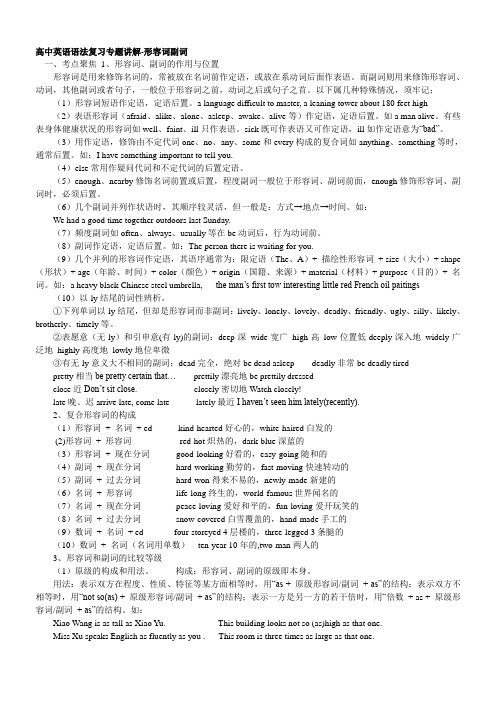
高中英语语法复习专题讲解-形容词副词一、考点聚焦1、形容词、副词的作用与位置形容词是用来修饰名词的,常被放在名词前作定语,或放在系动词后面作表语。
而副词则用来修饰形容词、动词,其他副词或者句子,一般位于形容词之前,动词之后或句子之首。
以下属几种特殊情况,须牢记;(1)形容词短语作定语,定语后置。
a language difficult to master, a leaning tower about 180 feet high(2)表语形容词(afraid、alike、alone、asleep、awake、alive等)作定语,定语后置。
如a man alive。
有些表身体健康状况的形容词如well、faint、ill只作表语。
sick既可作表语又可作定语,ill如作定语意为“bad”。
(3)用作定语,修饰由不定代词one、no、any、some和every构成的复合词如anything、something等时,通常后置。
如:I have something important to tell you.(4)else常用作疑问代词和不定代词的后置定语。
(5)enough、nearby修饰名词前置或后置,程度副词一般位于形容词、副词前面,enough修饰形容词、副词时,必须后置。
(6)几个副词并列作状语时,其顺序较灵活,但一般是:方式→地点→时间。
如:We had a good time together outdoors last Sunday.(7)频度副词如often、always、usually等在be动词后,行为动词前。
(8)副词作定语,定语后置。
如:The person there is waiting for you.(9)几个并列的形容词作定语,其语序通常为:限定语(The、A)+ 描绘性形容词+ size(大小)+ shape (形状)+ age(年龄、时间)+ color(颜色)+ origin(国籍、来源)+ material(材料)+ purpose(目的)+ 名词。
小学英语语法形容词,副词的用法总结整理归纳

eg:He is taller than me. 他比我高。
The girl is more beautiful than before. 这个女孩比以前漂亮多了。
Jack runs faster than his brother. 杰克跑得比他哥哥快。
②“which/who is + 形容词/副词比较级, A or B ?”
① 时间副词一般放在句尾或句首,有时可以放在动词前面。
eg: I often do exercises in the morning. 我经常在早上做操
Tomorrow many people will go for a picnic.明天很多人将要去野餐。
② 地点副词一般放在句尾,有时可以放在句首(如 here/there)。
always(一直),usually(通常),often(经常), sometimes(有时候)never(从不),once(一次), twice(两次)
疑
问
how(如何),where(在哪里),when(什么时候),
主要是用来构成特殊疑问句。
副
why(为什么)
词
三、形容词/副词的位置 (1)形容词的位置
意思为“A 和 B,哪一个更……”。
eg:which is bigger,the sun or the moon ?
哪一个更大,地球还是月亮?
Who is cleverer,Lily or Lucy ?
谁更聪明,莉莉还是露西?
③“the + 形容词比较级 + of + 名词”,意思为“两者之间较……的一个”。
小学语法—形容词和副词
一、形容词/副词的定义
形容词:用来修饰名词或者部分代词的词。形容词一般翻译成“……的” 副词:修饰动词、形容词、其他副词或全句的词,表明方式,时间,地点、程度 等。副词一般翻译成“……地/得” eg:She is a beautiful girl.他是一个漂亮的女孩。 (形容词修饰名词)
英语(核心语法)之形容词与副词英语二轮复习语法专项之「形容词与副词」—知识网络
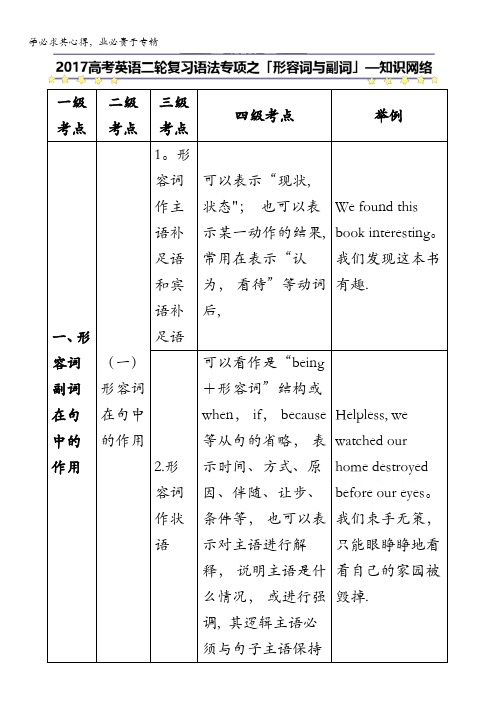
一级考点二级考点三级考点四级考点举例一、形容词副词在句中的作用(一)形容词在句中的作用1。
形容词作主语补足语和宾语补足语可以表示“现状,状态";也可以表示某一动作的结果,常用在表示“认为,看待”等动词后,We found thisbook interesting。
我们发现这本书有趣.2.形容词作状语可以看作是“being+形容词”结构或when,if,because等从句的省略,表示时间、方式、原因、伴随、让步、条件等,也可以表示对主语进行解释,说明主语是什么情况,或进行强调, 其逻辑主语必须与句子主语保持Helpless, wewatched ourhome destroyedbefore our eyes。
我们束手无策,只能眼睁睁地看着自己的家园被毁掉.的”;content “满意的”等。
一级考点二级考点三级考点四级考点举例形容词副词分类形容词分类2.复合形容词副词词干+分词hardworking 勤劳的名词词干+过去分词manmade人造的名词词干+现在分词timeconsuming 耗时的名词词干+形容词worldfamous 世界闻名的数词词干+名词ivestar 五星级的数词词干+名词-edthreelegged 三条腿的数词词干+名词+形容词fiveyearold 5岁的一级考点二级考点三级考点四级考点举例三、形容词副词的位置(一)形容词的位置1。
形容词后置修饰somebody,someone,something,anybody,anyone,anything,nobody,nothing等复合不定代词的形容词,则必须放在不定代词之后。
This isn’t anything important。
这并不是什么重要的东西。
形容词短语作定语必须We need a place twice larger than thisone.一级考点二级考点三级考点四级考点举例形容词副词的位置副词的位置2。
- 1、下载文档前请自行甄别文档内容的完整性,平台不提供额外的编辑、内容补充、找答案等附加服务。
- 2、"仅部分预览"的文档,不可在线预览部分如存在完整性等问题,可反馈申请退款(可完整预览的文档不适用该条件!)。
- 3、如文档侵犯您的权益,请联系客服反馈,我们会尽快为您处理(人工客服工作时间:9:00-18:30)。
fairly, pretty, rather, quite, very, much, too, 1. 程度副词: greatly, almost, nearly, half, highly等
前 面。 一般放在被修饰的形容词或副词____
I am really sorry to hear that. The weather here is quite different from that in Nanjing. The girls works very hard.
③变化类: become, grow, get, go, turn, fall
④持续系: keep, stay , remain
宾语 的性质、状态 4.形容词修饰补充说明_____
1) Running in the morning makes him strong. 2) We think the film really interesting. 3) Who has left the door open? 4) I found her asleep on the grass.
物
2.当形容词修饰由some-,any-,no-, every-构成的不定 不定代词的之后 代词时,形容词要放在______________ something _______ wrong with the watch. 4) There is _________ 这个手表有点问题。 5) Is there ________ _________? anything important 有什么重要的事情吗?
5. 方式副词: 表示行为方式的副词大多以 ly结尾, 如 quietly, heavily, warmly, carefully, happily, politely, angrily等。
后 面。 1) 通常放在动词____ She walked into the classroom happily. Mike wrote carefully some letters to his parents.
形容词在句中常作______ 补语 。 表语 和______ 定语 、______
1) He is a tall man.
定语
2) There is something wrong with the watch.
定语
3) He is clever.
表语
4) Running in the morning makes him strong.
2. 时间副词: now, then, soon, ago, recently, lately, later, before, early, today, tomorrow, yesterday, tonight, suddenly, immediately, still, already, just等 3. 地点副词: here, there, up, down, away, nearby, home, ahead, abroad, indoors, overseas, upstairs, downstairs等 地点 后_____ 末 ,先_____ 时间 通常位于句___ They went swimming in the river yesterday.
首 时间副词还可以放在句___ Yesterday they wen.
4. 频度副词: always, usually, often, frequently, seldom, sometimes, never, hardly, rarely, constantly, occasionally等
1)通常___ 助动词/情态 动词之后 be 动词、___________ The boy is often late for school. I have never seen such a good film.
前 2)通常放在行为动词之___
He usually goes to school on foot.
1) He is strong. 3) The soup tastes delicious. 3.形容词可以放在 _______ 系动词 后
2) It’s getting warm. 4) She fell asleep.
①状态系: be, is, am, are, was, were, been ②感官系: feel, look , appear, seem, sound, taste, smell
形容词(adj.)和副词(adv.)
一. 翻译下列句子,划出句中的形容词(adj.)
1) He is a tall man.
2) There is something wrong with the watch.
3) He is clever. 4) Running in the morning makes him strong.
1. 形容词常放在 ______ 名词前;它们前面常带有冠词 、 物主代词、指示代词、数词等
1) He is a tall man.
2) My beautiful present is on the desk.
3) I have five red pencils.
1.形容词常放在名词前;它们前面常带有冠词、 主代词、指示代词、数词等
补语
二. 什么是副词?有哪些种类?
翻译下列句子,指出画线部分单词的词性
1. It’s very late now. Don’t go out!
程度副词 时间副词 地点副词 2. It frequently rains heavily in spring. 频度副词 方式副词
修饰动词,表示动作发生的程度、时间、地点、 频度、方式等或表达状态的词叫副词。
